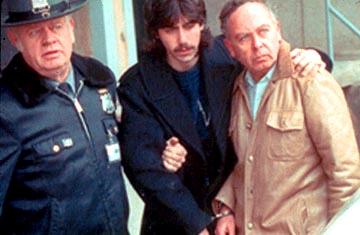Capturing the Friedmans


In 1987, police charged Arnold and Jesse Friedman with an unbelievable array of child molestation charges revolving around computer classes that Arnold taught in the Friedman household basement. The Friedman's lived in Great Neck, New York, a small enclave of upper class citizens off a small peninsula. The charges were even more shocking given that Arnold was married, the father of three, and an award winning and popular teacher. The media circus that erupted around the charges were reminiscent of the McMartin Preschool case and eerily prescient of the direction that some of the tabloid media would head towards in the next decade. What sets Capturing the Friedman's apart from other documentaries is the wealth of firsthand source material documenting the slow collapse of the Friedman family.
The Friedmans, and Arnold in particular, were huge fans of technology. They meticulously recorded various aspects of their lives with video, including events transpiring after the allegations surfaced. Director Andrew Jarecki had permission to use much of this footage, which gives the unique, often unavailable viewpoint of the accused as events unfold. He has a lot of historical footage, so one can get a sense of the Friedman family unit in better days, and later footage where, to put things lightly, things are a tad bit tense. Jarecki even got David to donate a powerful private video diary, recorded amidst the chaos, where he vents his frustrations and fears directly into the camera. Capturing the Friedmans came about by kismet, when Jarecki was interviewing eldest son David about his job as a birthday clown for children. He had no idea about David's background. Throughout the film, David serves as the most ardent supporter of his father and brother's innocence. Second child Seth chose not to participate in the documentary, and his voice is sorely missed.
What is immediately clear is that the case surrounding the Friedmans is complicated. If one was to believe the allegations of the prosecution, then children would be molested, then leave when their parents arrived, for each and every class in their computer class over ten weeks. No children complained until police approached and questioned them, and there was no evidence of blood or abuse. Other children look back fondly on Arnold's computer classes, saying nothing of the sort happened. On the other hand, the investigation began when postal inspectors discovered that Arnold was sending and receiving child pornography through the mail. He admitted doing this, but was adamant in his innocence for the molestation charges. There was a mountain of child pornography in his house, but did he actually take the next step and molest children? There is a huge amount of conflicting information on both sides to further muddy the waters.
Child molesters are the lowest of the low (with good reason). The head detective investigating the case correctly states that a false accusation is enough to ruin one's life. In jail, child molesters are treated with contempt and showered with death threats by all the other inmates. So when the allegations are as numerous as they are here, it becomes a big deal. Jarecki tries to avoid taking sides, but it's clear that he is more sympathetic to the Friedman cause, at least on Jessie's behalf. He does make it a point to tell both sides of the story, which is good. However, Capturing the Friedmans is less about the trial itself and more about how the allegations ripped the Friedman family apart. David and Jessie filmed tense family arguments, with the family split by gender. Arnold's wife Elaine feels like she is battling uphill, while David feels that Elaine is betraying the family. There are also scenes of the Friedmans calm, serene, and almost happy, despite the trouble swirling around them. It's like they believe if they impose a false sense of normalcy, then thing may become normal. Events unfold quickly like a soap opera, with a surprising amount of twists and turns, which makes forces viewers to pay rapt attention.